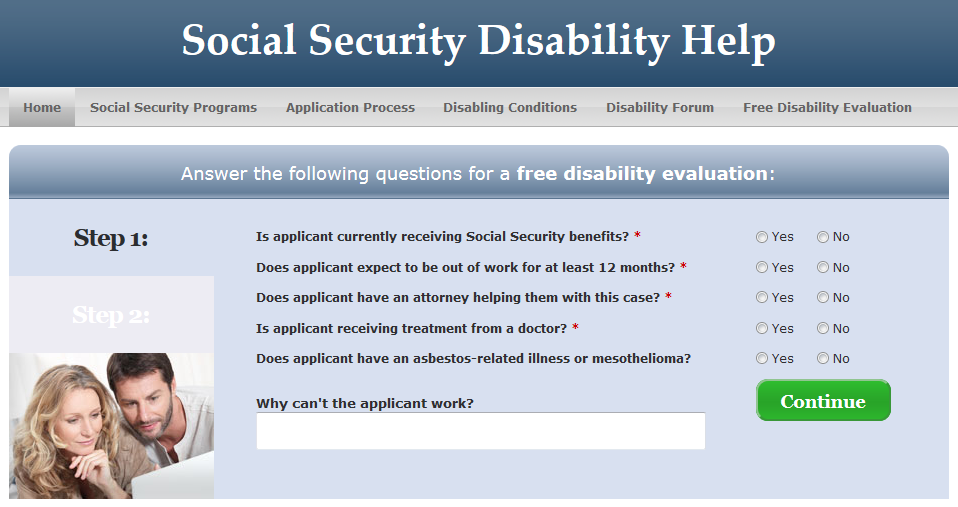Applying for Disability Benefits with Alzheimer’s Disease
Applying for Disability Benefits with Alzheimer’s Disease
Alzheimer’s disease is an inherently disabling condition and is recognized as such by the Social Security Administration (SSA). However, when applying for Social Security Disability (SSD) benefits with Alzheimer’s disease, you must still properly document your claim and complete all of the required forms in order to avoid delays in the processing of your application and the approval of your disability benefits.
No Dedicated Listing for Alzheimer’s disease in the SSA’s Blue Book
The SSA maintains a manual, known as the Blue Book (http://www.ssa.gov/disability/professionals/bluebook/), which contains listings of recognized disabling conditions. While Alzheimer’s is a recognized disability and the SSA knows it is an inherently debilitating disease, there is no dedicated listing in the Blue Book for the condition.
This is because Alzheimer’s usually strikes people who are age 65 and older, the majority of whom are already receiving Security retirement benefits at the time their Alzheimer’s is diagnosed. However, if you are under 65 it is possible to receive disability benefits from the SSA based on Alzheimer’s.
Meeting the SSA’s Listing for Dementia or Organic Mental Disorders
While there is no dedicated listing for Alzheimer’s in the SSA’s Blue Book, applications filed on a diagnosis of Alzheimer’s are typically reviewed under the criteria that appears in the listing for organic mental disorders, which appears in Section 12.02 of the Blue Book.
To meet this listing, your medical documentation must show a significant loss in cognitive ability, demonstrated by at least one of the following lasting symptoms:
· disorientation with an inability to determine location and/or time
· impaired short term, intermediate, or long term memory
· disturbance in perception or thinking, including potentially delusions or hallucinations
· personality changes
· mood disturbances
· emotional impairment or impulse control problems
· loss of intellectual ability, recorded by a marked drop in IQ of 15 points or more
In addition to documenting the presence of at least one of the previously mentioned symptoms, your medical documentation for supporting your Alzheimer’s SSD claim must additionally show your symptoms have caused at least two of the following to occur:
- marked limitations in the performance of normal, daily activities
- severe difficulty in functioning socially
- pronounced issues with concentrating, remaining on task, or completing tasks at a reasonable or normal pace
- repeated and long periods of decompensation, where you backslide in your abilities
You may also meet the listing in Section 12.02 by showing your Alzheimer’s has progressed for two years or longer, leading to limitations in your everyday abilities and:
- presents with recurrent episodes of decompensation
OR
- worsens with a change in environment, exposure to stress, or with increased demand for mental or emotional exertion
OR
- requires you live in a supportive living environment due to an inability to function without ongoing care and monitoring.
Early Onset Alzheimer’s
Early Onset Alzheimer’s is among the conditions the SSA includes in its Compassionate Allowances (CAL) program. CAL is designed to expedite the claims process for applications filed on certain conditions, which are known to cause severe disability or which are terminal illnesses.
While the CAL program ensures your application will proceed through the review process more quickly, it does not guarantee:
· your claim will automatically be approved
OR
· that there will not be delays in the receipt of benefits if:
o your medical documentation is lacking
OR
o other information is missing from your claim.
For these reasons, it is essential that you treat your Early Onset Alzheimer’s application as you would any other Alzheimer’s claim and complete the full application process and make sure you have thorough and complete medical records for documenting your diagnosis and showing its effects.
Alzheimer’s and Filing a Disability Application
You can file a disability application either online or at your local SSA office. Visit the SSA’s office locator page to find the office closest to you.
While denial of SSD applications based on Alzheimer’s disease is rare, it does happen. Usually this is due to a lack of sufficient medical documentation or the failure to provide complete information on the application or other forms required by the SSA. You do not have to go through the SSD application process alone. You can seek assistance from a social security disability attorney or advocate.
Article by Ram Meyyappan
www.disability-benefits-help.org



You will have to wait after filing claim close to 90 days, that is the time frame they have to accept or deny your claim. If claim is turned down you can file an appeal which will take another 90 days for an answer. I would recommend that you get an advocate if the claim is rejected the first time to fight for you. I had that problem, finally used a firm Binder & Binder, who got me a hearing and after alot of forms and statements from doctors and appearing before an Administrative Law Judge, and a gov. doctor and someone else, I got my decission in about 2 months. Total process took almost 2 years, because I tried to fight it myself. So file and make sure you have a lot of documentation from your doctors to back you up, tests, ri’s, cat scans, pet scans, phycologist and pshyciatry reports and your general practitioner and any neurologist reports. I hate to say this but they are there to find a way to deny the claim, so be prepared to fight if necessary. There are many times they approve the claim first shot. and the first 6 months from date of disability are not paid.
God Bless,
joe
Thanks for the great insights Joe. This will help many!
Lori